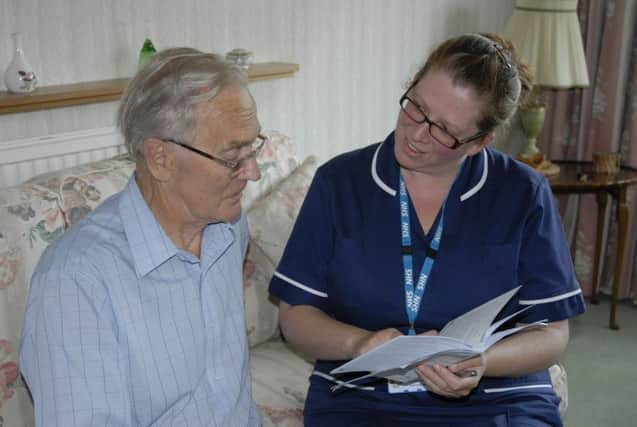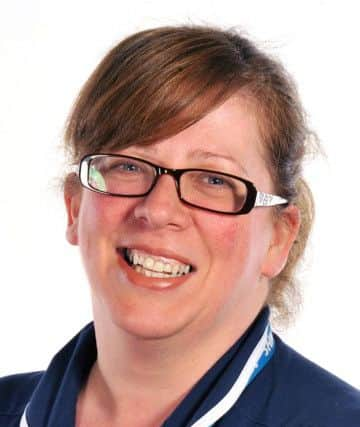'Cures would never be found if people weren't willing to take part in trials'


When Susan’s mum kept repeating herself and showing signs of forgetfulness, at first she and her father put it down to old age.
However, as time went on and the symptoms continued, they began to suspect dementia.
Advertisement
Hide AdAdvertisement
Hide AdAs Susan’s mum refused to go to the doctors and then when she did, other things had to be ruled out, it was about a year later that her 81-year-old mum who lives in Lea, Preston, was diagnosed with Alzheimer’s Disease.


Susan’s mum has now become the first person in the UK to be recruited on to a study looking at a new medication which may halt the progress of Alzheimer’s.
Susan, 47, whose name has been changed as participants on the research study have to remain anonymous, explains: “My mum kept repeating herself again and again.
“At first, you just put it down to old age.
“If you went to visit, she would ask: “Would you like a drink?” and you’d say no thank you.


“But then a few minutes later, she would ask you again.
Advertisement
Hide AdAdvertisement
Hide Ad“We suspected Alzheimer’s for a while but she wouldn’t go to the doctors. Then when she went to the doctors, they found her vitamin levels were very low and this can lead to symptoms of dementia.
“She had to have a course of injections to boost her vitamin levels and once they got these right, she was still showing the same symptoms so she was referred to the memory clinic and diagnosed with Alzheimer’s Disease.”
Susan says her mum is on an even keel at the moment but gets worse in the evenings, known as “sundowning.”
She says: “My mum imagines she is seeing things and gets very forgetful.
“She sees relatives who passed away years ago.
Advertisement
Hide AdAdvertisement
Hide Ad“She knows they are not real so finds it confusing and upsetting.
“As soon as it gets dark, this starts happening.
“Sometimes, she does not recognise my dad and thinks he is her brother or another relative.
“But during the day, she is fine and apart from the odd thing she will say, you would not know there was anything wrong with her.”
When Susan’s mum went to the memory clinic at Bamber Bridge run by Lancashire Care Foundation Trust, the family were told about a research study trialling a new Alzheimer’s Drug and were asked if they would like to take part.
Advertisement
Hide AdAdvertisement
Hide AdSusan says: “It looks like this drug may be able to halt Alzheimers and stop the symptoms getting any worse.
“My mum is taking part in a three month trial.
“We said yes to taking part because even though it probably won’t help my mum, it will help people in the future.
“Drugs would never get developed and cures wouldn’t be found if people weren’t willing to take part in trials and research studies.
“My mum takes the medication which is three tablets every day for four weeks. Then she will go back to get checked with memory tests and this will carry on for three months.
Advertisement
Hide AdAdvertisement
Hide Ad“If anyone else is thinking of taking part in a research trial, I would encourage them to do it as we have had such a positive experience.”
The research study is looking at a new medication to treat dementia of an Alzheimer’s type.
The study is aimed at people aged 50 to 85 with a diagnosis of Alzheimer’s.
The team, who work in partnership with Lancashire Teaching Hospitals, were winners of the inaugural Clinical Research Nursing Award at the 2014 Nursing Times Awards for their work around dementia research.
Advertisement
Hide AdAdvertisement
Hide AdKaren Palmer, clinical research nurse manager at Lancashire Care NHS Foundation, says: “Research plays such an important role in the development of medicine and treatment.
“We work with universities and other partner organisations to provide access to the latest research opportunities for both staff and service users.
“We are seeing a rise in people being diagnosed with dementia and it is important that we are able to develop new and advanced treatments to help ease the symptoms of living with this illness.”
“This particular research study is being done at 50 to 60 sites across Europe and six in the UK.
Advertisement
Hide AdAdvertisement
Hide Ad“It is looking at a new drug which we can give to people with a diagnosis of Alzheimers which is about alleviating the symptoms.
“The feedback we get from patients taking part in research studies is that they appreciate the additional nursing support they get while doing a trial.
“Many of them also feel it is important for them to feel they are adding to the body of knowledge for future treatments of Alzheimer’s.”
Dementia is an umbrella term which describes a set of symptoms which can include memory loss and difficulties with problem solving or language.
Advertisement
Hide AdAdvertisement
Hide AdThe symptoms are caused by various diseases including Alzheimer’s.
There are more than 520,000 people in the UK living with Alzheimer’s disease, which is caused by a build-up of proteins in the brain which leads to a loss of connections to nerve cells.
Dr Salman Karim, consultant psychiatrist and the doctor leading the study, says: “Conducting clinical trials in Alzheimer’s disease is always challenging and requires a team effort.
“It’s important that we carry on doing this vital research as it has been more than 10 years since the last medication for Alzheimer’s was licenced.
Advertisement
Hide AdAdvertisement
Hide Ad“I am very proud of my team and grateful for my patients who choose to participate in such studies.”
- For more information about how to get involved in research visit: www.lancashirecare.nhs.uk/research. For more information about Alzheimer’s, visit www.alzheimers.org.uk.